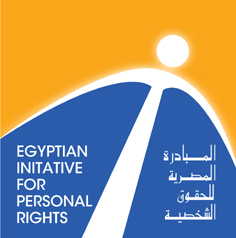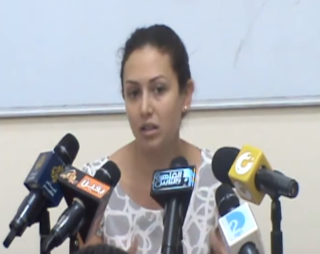Related Research Articles
Capital punishment is a legal penalty in Egypt. The state carried out at least 44 executions in 2016, at least 35 in 2017, and at least 43 in 2018. On 8 September, 2020 a court in Egypt sentenced 75 people to death and 47 others to life imprisonment.They were charged with murder, membership in a terrorist group. The British newspaper Independent has reported that Najia Bounaim of Amnesty International Middle East and North Africa described the court's sentence to “disgraceful" and "a mockery of justice.". The method of execution is hanging for civilian convictions, and by firing squad for convictions by commissioned military personnel at the time of duty.

Alaa Ahmed Seif Abd-El Fattah, known professionally as Alaa Abd El-Fattah, is an Egyptian blogger, software developer and a political activist. He has been active in developing Arabic-language versions of important software and platforms. He was imprisoned in Egypt for allegedly organising a political protest without requesting authorization, though he was released on bail on 23 March 2014. He was rearrested and ordered released on bail again on 15 September 2014, subsequently sentenced to a month of jail in absentia, and received a five-year sentence in February 2015, which he was released from in late March 2019. El-Fattah remained subject to a five-year parole period, requiring him to stay at a police station for 12 hours daily, from evening until morning. On 29 September, during the 2019 Egyptian protests, El-Fattah was arrested by the National Security Agency and taken to State Security Prosecution on charges that were unknown as of 29 September 2019.

Human rights in Egypt are guaranteed by the Egyptian Constitution under the various articles of Chapter 3. The country is also a party to numerous international human rights treaties, including the International Covenant on Civil and Political Rights and the International Covenant on Economic, Social and Cultural Rights. However, the state of human rights in the country has been criticized both in the past and the present, especially by foreign human rights organizations such as Amnesty International and Human Rights Watch, although the Egyptian government has frequently rejected such criticism. According to human rights groups there are some 60,000 political prisoners in Egypt. During violent clashes that ensued as part of the August 2013 sit-in dispersal, as many as 900 protesters were killed with 14 August 2013 becoming the single deadliest day in Egypt's modern history.

The Egyptian Initiative for Personal Rights or EIPR is an independent Egyptian human rights organization, established in 2002. It is a Cairo-based think tank.
The trials and judicial hearings following the 2011 Egyptian Revolution were a series of legal moves to establish accountability among the various Egyptian government officials and prominent businessmen.

Mohamed Mohamed Morsi Issa Al-Ayyat was an Egyptian politician and engineer who served as the fifth President of Egypt, from 30 June 2012 to 3 July 2013, when General Abdel Fattah el-Sisi removed him from office in a coup d'état after protests in June. An Islamist affiliated with the Muslim Brotherhood organisation, Morsi led the Freedom and Justice Party from 2011 to 2012.

Khaled Ali is an Egyptian lawyer and activist. He is known for his advocacy for reform of government and private sector corruption and for promoting social justice and labor rights. He is the former head of the Egyptian Center for Economic and Social Rights (ECESR), and co-founder of the Front for Defending Egyptian Protesters and the Hisham Mubarak Law Center (HMLC).

The Road of the Revolution Front – Revolutionaries, also translated as Way of the Revolution Front and Revolution Path Front, is an Egyptian political movement created in September 2013 by leftist and liberal activists in order to achieve the goals of the Egyptian Revolution of 2011 of bread, freedom and social justice.

Tora Prison is an Egyptian prison complex for criminal and political detainees, located in Tora, Egypt. The complex is situated in front of the Tora El Balad metro station. The main buildings in the Tora Prison complex are Tora Agricultural Prison, Tora Liman, Tora Istiqbal (reception), Tora El Mahkoum and Tora Supermax prison, also known as Scorpion Prison.

Yara Sallam is a prominent Egyptian feminist and human rights advocate. She has worked as a lawyer and researcher for several Egyptian and international human rights organizations, as well as for the African Commission on Human and Peoples’ Rights (ACHPR).
The Ettehadiya case is a controversial legal case in Egypt where thousands of protesters went down to the Ittihadiya Palace, the Presidential offices in Cairo, asking for the repeal of the newly issued protest law as part of the international day for the solidarity with the Egyptian detainees on 21 June 2014. The march headed for the Heliopolis presidential Palace was demanding the repeal of the protest law and the release of prisoners of conscience - including the prominent human rights Activists Alaa Abd El-Fattah - was attacked by security forces using teargas and at least 30 activities were arrested among them awarded Human Rights defender Yara Sallam, young activist and filmmaker Sanaa Seif and contemporary art dancer Mohamed Anwar Masoud Moftah.

Mohamed Fadel Fahmy is an Egyptian-born Canadian award-winning journalist, war correspondent and author. He has worked extensively in the Middle East, North Africa, for CNN, BBC and Al Jazeera English.
On December 29, 2013, three journalists working for the Qatari-based international news channel Al Jazeera English, Australian Peter Greste, Canadian Mohamed Fahmy and Egyptian Baher Mohamed were taken into custody by Egyptian security forces at the Marriott Hotel in Cairo following a raid at their room, which was used for the news channel's remote studio. The Egyptian Interior Ministry confirmed the arrest and said the journalists were accused of reporting false news which was "damaging to national security".
Sanaa Seif is an Egyptian activist and film editor who became actively involved in the Egyptian revolution in 2011. She was a student of language and translation at October 6 University until her arrest in 2014. She was granted a presidential pardon, along with 100 others, in September 2015.
The Arab Sharkas case is the name given to the military trial of nine men in Egypt in August 2014. Six defendants were sentenced to death in October, and executed in May 2015.

Ahmed Seif El-Islam was an Egyptian communist, human rights activist and lawyer. He was father of the social activists Alaa Abd El-Fattah, Sanaa Seif and Mona Seif. His wife was social activist and professor Laila Soueif, sister of novelist Ahdaf Soueif.
The 2019 Egyptian protests consisted of protests by over two thousand people in Cairo, Alexandria, Damietta and other cities on 20, 21 and 27 September 2019 in which the protestors called for President Abdel Fattah el-Sisi to be removed from power. Security forces responded with tear gas, rubber bullets and live bullets and, as of 23 October 2019, 4300 arbitrary arrests had been made, based on data from the Egyptian Center for Economic and Social Rights, the Egyptian Commission for Rights and Freedoms, the Arabic Network for Human Rights Information, among which 111 were minors according to Amnesty International and the Belady Foundation. Prominent arrestees included human rights lawyer Mahienour el-Massry, journalist and former leader of the Constitution Party Khaled Dawoud and two professors of political science at Cairo University, Hazem Hosny and Hassan Nafaa. The wave of arrests was the biggest in Egypt since Sisi formally became president in 2014.
The welcome parade is a form of running the gauntlet used against new prisoners in some countries, including Egypt.
Events of 2020 in Egypt.
The 2020 Egyptian protests, also known as the Gallabiya uprising, were decentralised street protests in Egypt that started on 20 September 2020, the anniversary of the 2019 Egyptian protests, calling for Egyptian president Abdel Fattah el-Sisi to resign. Protest locations included Cairo, Giza, Suez, Kafr El Dawwar, Alexandria, Aswan, El Qanater El Khayreya, Faiyum, Minya and Luxor. The sixth day of protests, on 25 September, was called a "Day of Rage".
References
- 1 2 3 4 5 6 7 Lynch, Sarah (17 March 2015). "New Egyptian Law Firm Fights for Student Rights". al-Fanar Media . Archived from the original on 1 October 2019. Retrieved 1 October 2019.
- 1 2 3 4 5 "'We're being chased': Egyptian human rights lawyers struggle under crackdown". Middle East Eye . 30 September 2019. Archived from the original on 30 September 2019. Retrieved 30 September 2019.
- 1 2 3 "Following Wednesday's executions: 15 people executed in one month this year, nine executed without even notifying their next of kin, among other violations that obstruct the course of justice". Egyptian Initiative for Personal Rights . 21 February 2019. Archived from the original on 1 October 2019. Retrieved 1 October 2019.
- ↑ Rifky, Sarah; Attalah, Lina (1 October 2019). "Alien feelings follow friends and lovers' abduction by a dystopian state". Mada Masr . Archived from the original on 1 October 2019. Retrieved 1 October 2019.